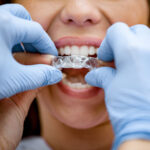Dental Hygienist Visits
You brush your teeth, you floss your teeth, and you use a great quality mouth rinse. Not only does a good home oral health care routine help to keep your teeth and gums healthy, but it just feels better when our teeth are clean.
When last did you sit down in the chair for treatment with your dental hygienist? Even with a great home oral hygiene routine, it’s essential that you make an appointment to get your teeth professionally cleaned at least once a year preferably twice.
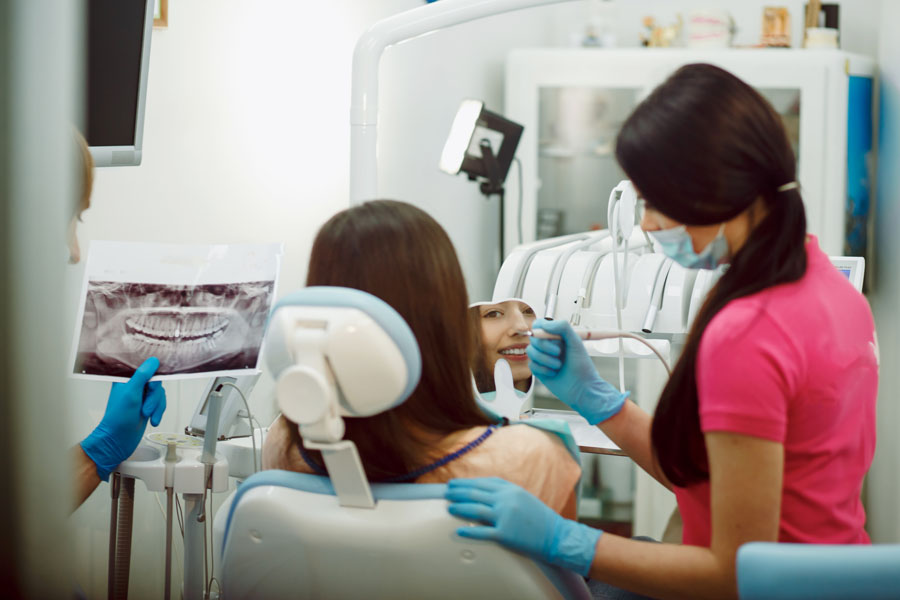
What is professional teeth cleaning?
It is imperative that you brush twice daily and floss once, to minimise the risks of decay and infection. It’s just as important that you get a good deep cleaning done by a professional dental hygienist. This is because none of us are perfect and even the most enthusiastic and diligent cleaner will miss areas. The dental hygienist has the knowledge and experience, along with the right equipment, needed to deep clean every part of each tooth and below the gum line.
Even the best of toothbrushes can’t reach these areas and cannot remove tartar.
It is suggested that every member of the family is seen by their dentist every six months for a routine examination and a professional cleaning. Those routine visits can allow both the dentist and dental hygienist to spot any minor concerns before they escalate and ultimately lead to significant problems. Prevention is better than cure
Professional cleaning should be considered more of a preventative and essential oral health maintenance treatment. One of the primary reasons that patients have their teeth cleaned is to keep the gum healthy and in its present position supporting the teeth. Gingivitis is a temporary inflammation of the gum which can be easily treated- a stitch in time!
Gum disease stems from ongoing inflammation/gingivitis and infection and is usually a longterm process that is the leading cause of tooth loss worldwide. Once gum disease becomes established it is harder to treat. However, gum disease can be treated and stabilized and many patients live quite happily with some gum loss once the situation is stabilized. Gum infection treatment helps to prevent further damage.
The dental hygienist will remove the tartar buildup that can contribute to infection, pockets of detached gum, recession, tooth loss and of course, keep your teeth beautifully clean.
A relatively new and troubling development has been the association discovered between gum disease and problems with your health in general. It has long been noted that there is a link between coronary heart disease and gum disease. Also, people with gum problems have much higher stroke rates. The list continues to grow with serious conditions like dementia and pancreatic cancer seemingly having connections to untreated gum problems with the mechanism not always clear. Powerful motivation to look after your gums though!
Your hygienist will also have the expertise to spot and diagnose other gum conditions such as leukoplakia, candidiasis or even mouth cancer.
Prior to the start of the procedure, your dentist will take the chance to perform a quick examination of your teeth. This is simply to ensure that there are no signs of decay or other concerns that will need to be addressed.
The dental hygienist will then use a variety of tools to remove the tartar that has accumulated on the surface of each tooth. The tartar can often be found hiding between the teeth and below the gum line. This buildup cannot be removed by brushing and flossing alone.
Once the scaling part of the procedure has been completed, each tooth will be polished using a mildly abrasive toothpaste. The toothpaste is not abrasive enough that you need to worry about damage to your teeth. It will, however, help to remove any surface stains on your teeth.
Your teeth may also be completely flossed in order to remove any additional debris between the teeth and to identify where there may be sensitivity in the gums.
There may be a little bit of sensitivity during a comprehensive cleaning, but you can request a topical numbing agent to help minimise any discomfort that you may feel. If particular areas are too sensitive a local anaesthetic injection may be given. Tooth cleaning becomes much easier when it is conducted regularly as there is less to clean off and the gums aren’t becoming as inflamed.
It is said that you should only clean the teeth you want to keep! A professional scale and polish maintains the teeth and gums helping to avoid their extraction and replacement down the road. It also opens up options to improve the teeth aesthetically such as composite bonding, veneers, whitening and orthodontics- none of which should be conducted in the presence of gum problems.
On a day to day note, your teeth will look better and your mouth will be healthier. Your breath will smell fresher which is important for everyone but more especially if you work in close proximity to anyone else.
It’s important to note that gum inflammation has been closely linked to higher risks for patients developing heart disease and a host of other medical concerns.
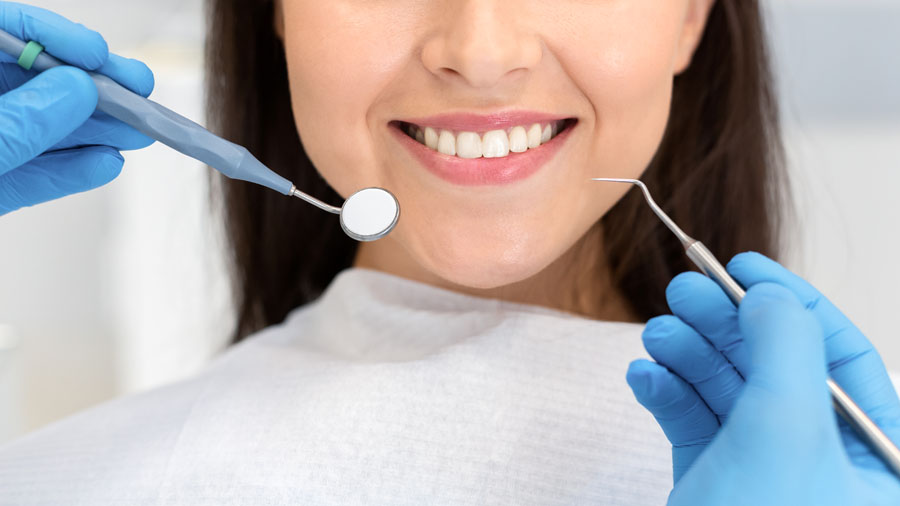
What is the cost for a dental hygienic treatment?
At Cork City Dentist we provide our patients with the benefit of our many years of combined experience. Our competitively-priced wide range of dental treatments puts quality dental health care well within reach.
Schedule your professional cleaning today. You can review our pricing schedule below to learn more about what you could expect to pay. Book your appointment online or call our clinic to speak to one of our knowledgeable members of staff.
| Treatment | Price |
|---|---|
| PRSI - Annual Examination (including oral cancer screening) | FREE |
| PRSI - Scale and Polish | €15-25 |
| Examination (including oral cancer screening) | €40 |
| Scale and Polish | €80 |
| Prescriptions | €30 |
| Fissure Sealants | €25 |
| Hygienist visit | €75 |
| Periodontal therapy/treatment of gum disease per visit | €80-90 |
| Dental Splint/Nite guard - Light | €200 |
| Dental Splint/Nite guard - Heavy Duty | €400 |
| Small X-rays | €10 each |
| Panoramic X-ray | €80 |
Take the time to schedule your routine professional cleaning? Don’t delay taking good care of your teeth and gums. Book your professional teeth cleaning online or call our clinic at 0214501306.
Other Treatments you may consider

Dental Check-ups
Preventing small dental issues from flaring up into much more severe health problems is possible when you maintain a good check-up routine with our dentist. Both a check-up and consultation for additional dental services and treatments can help you to ensure proper oral health.

Fissure Sealants
The molars in our mouth have chewing surfaces that may feel smooth but, in fact, have many natural fissures or grooves and pits. These fissures or grooves are where decay can often first be seen. Even with a healthy daily oral health care routine, some of these fissures cannot be cleaned well enough to keep the tooth decay-free.

Oral Cancer Screening
Early detection is of paramount importance in reducing mortality from oral cancer. Survival rates are above 80% if diagnosed early and below 30% later. Oral cancer, especially in men, is the 8th most common cancer worldwide. Most of the oral tumours develop in areas that can be seen or noticed by your dentist, so early detection is possible.
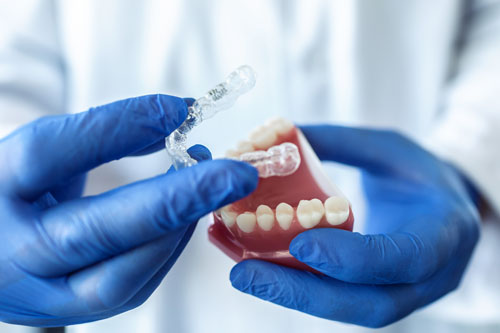
Gum Shields & Mouth Guards
Trauma to the teeth and mouth can result in lacerations and bleeding to the gums. It can also fracture or dislodge teeth. Whether as the result of an accidental strike directly to the mouth or due to a knock on the chin crashing your teeth together, impacts to the mouth can result in a variety of injuries, one more serious than the next.

Root Canal Treatments
If your tooth has suffered an injury or perhaps you have severe decay in a tooth, you may require a root canal treatment. Early signs of permanent nerve damage may be a toothache coming on for no reason. Waking you from sleep and not responding to painkillers.
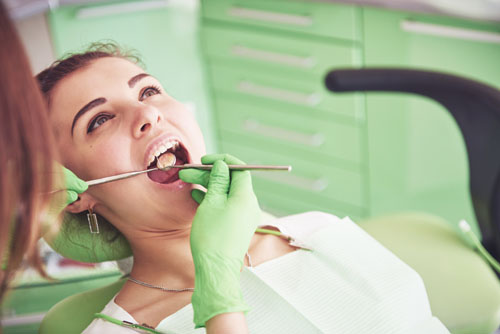
Tooth Fillings
A cavity is a small hole on a tooth that is the result of tooth decay. The sugar we eat and drink creates an acidic environment that allows the mineral to escape our tooth leaving a hole behind. If the cavity is not treated by a professional, you will be putting the tooth at risk of further decay and damage as the decay will continue inside the tooth unabated.
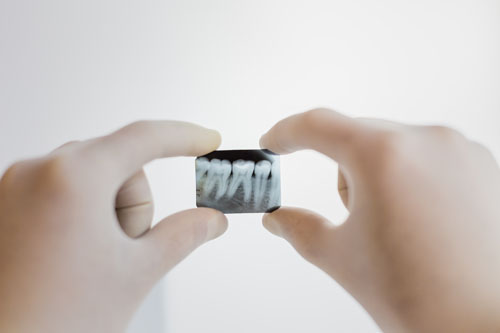
Wisdom Teeth Removal & General Extractions
There are several reasons that one or more teeth may need to be extracted. While no one enjoys hearing that they need to have teeth extracted, you’ll find that the compassionate and gentle touch our dentists offer will help to make the process just a little bit easier for you.
Frequently Asked Questions
First and foremost gum disease is an infection. Bacteria live in tartar also known as calculus which is the hard chalky material that can become stuck around your teeth. This is mostly made up of old food that has stayed in sheltered areas and hardened. Some of the tartar will be present above the gum line and yet more will cling below the gum. Once tartar is established it is impossible to remove at home. This tartar forms a physical barrier to the gum doing its job properly- that is covering and holding our teeth, however, that’s only part of the story. Our bodies sense the threat from the bacteria and the toxins they produce and send the bodies ‘soldier’ cells to the area to try and neutralize the bacteria.
Unfortunately, this inflammation is damaging to the gum itself. This extra blood in the area causes the gums to swell, appear redder and bleed easily.. This bleeding is often the most obvious sign, sometimes the only sign that there is an issue with your gums and should not be ignored. One of the big problems with gum disease or periodontal disease is that it can be very quiet and you may be unaware of it. Gums disease is often not painful apart from some specific types until very late in the condition when dramatically some teeth may feel a little loose. As mentioned before you may notice your gums are red or bleed when you brush. They may also appear shiny- in a healthy state gums usually will be pink and slightly dimpled.
You may notice your gums shrinking back or receding. This may uncover darker tooth near the gum line or dark triangles may appear between the teeth. A bad taste in the mouth and bad breath are common. Teeth may become sensitive as they aren’t covered tightly by gum thereby exposing root surfaces. At the early stages, gum disease is known as ‘gingivitis’ and is entirely reversible. Later on, inflammation becomes more entrenched in the jaw bone supporting the teeth and becomes ‘periodontitis’ which causes permanent damage to the bone supporting the teeth. Gum disease or periodontal disease is present in 50% of the population to some extent. It is advanced almost to the point of tooth loss in 5-20% of people. Some people are more at risk than others. Common risk factors are listed below
- Poor oral hygiene- lots of bacteria! Smoking Diabetes
- Cardiovascular disease
- Some medications especially if they are sweet or reduce saliva
- Epilepsy medication
- Stress
- obesity
- Osteoporosis Host response
- overactive immune system
- Pregnancy
- long term contraceptive pill use
- Age
- Genetics
Gum disease causes inflammation, swelling and bleeding in the gums. This along with the bacteria present and their toxic byproducts causes ‘bad’ breath. Longterm the gum will begin to breakdown and the bone underneath will begin to erode. This creates areas of gum that are adjacent to the tooth but not attached like it ought to be. This situation is called ‘pocketing’. Pockets of up to 3mm in depth are normal and natural but anything beyond this indicates gum breakdown.
In the short-term local medicaments can help such as chlorhexidine mouth wash commonly sold under the ‘corsodyl’ or ‘kin’ brands. Antibiotics are reserved for more acute, painful flare-ups. Both of these treatment options are rather like polishing barnacles stuck to a boat- in reality the barnacles have to be removed! The good news is that for the most part gum disease is a slowly progressive condition so if gum disease or periodontitis is diagnosed you usually have time to treat it. The main thrust of gum disease treatment is to remove the tartar stuck to the teeth where the bacteria live. This is done every six months usually as part of a routine scale and polish. Once gum disease is established a more extensive cleaning is required. This is called periodontal treatment or periodontal scaling. Often this necessitates so-called ‘quadrant’ cleaning which means splitting the cleaning into the mouths four corners over four visits, top left, top right, lower left and lower right. This allows the dentist or dental hygienist to spend more time on a smaller area, often numbing the area. All hard tartar will be cleaned off your teeth above and below the gum line and any rough surfaces which are attracting food smoothened. Occasionally some teeth will be so damaged that they may need to be extracted to preserve the health of the others. Any food traps or overhanging/ deficient old dental work ought to be remedied. Extensive oral hygiene instruction will be given. Perfect cleaning and home care into the future are essential to maintain the gum improvement. All being well gums will tighten up, stop bleeding and become pinker/less red. Teeth that previously were loose ought to tighten up to some degree. Very occasionally a person may be suffering from an aggressive, rapidly damaging form of gum disease or may not improve as anticipated with the treatment offered and a good home effort. Even more rarely extensive gum disease can affect someone at a younger age. In a these specific situations a referral to a gum specialist may be advised. This is called a periodontist and they are available in Cork.
Gum disease is not in general reversible however it can be stabilized. Many patients can quite happily eat, smile and live with a large amount of supporting bone missing around their teeth. It’s never too late. A periodontist may be able to conduct gum surgery and rebuild some bony defects. In the absence of this more radical option the gum can form a softer bond to the tooth which can be perfectly adequate. Extracting some teeth that are too far gone can reduce the bacteria and disease levels in the mouth generally. It may also make it much easier to clean the remaining teeth. Even if a large number of teeth must be lost keeping some healthy strong teeth can help with their replacement.
It has long been suspected and studied that some people are more susceptible to gum disease than others. Factors that may be a concern are your own body’s reaction to bacteria – that is our inflammatory or immune response, ability to heal and even the way our gums formed initially. Other factors you mightn’t think of as affecting your gums are genetic factors linked to your likelihood to be good at oral hygiene routines and resistance to addictive behaviours such as smoking.
Unfortunately at the moment an agreement on the risk factors you may inherit from your parents is lacking. Many variations in genes both common and rare can cause an increased risk of gum disease. It is important to note that if one person has no risk factors and another has all the genetic risk factors and both have perfect oral hygiene, attend the dentist regularly and generally look after their health then their gums will likely be similarly healthy. It sounds easy- as we all know it’s not!
Gum disease is not contagious and will not be passed from one person to another.
The studies to date have shown that chewing sugar-free gum does reduce plaque levels a little which could be expected to improve gum condition. It would have to be considered a VERY small help without a huge amount of evidence.
Good nutrition is important for every part of the human body and gums are no different. Like skin, the gum is constantly turning over and being replaced. Anything that impedes that process like smoking, being run down or lacking in the basic building blocks will reduce the quality and quantity of new gum made.
A well balanced diet with plenty of fresh vegetables will help keep your gums in good condition. Some supplements that also may help are zinc for our immune system, calcium, magnesium and silica for strong bones, vitamin C for healing and soft tissue health and Coenzyme Q10 for blood supply and energy production. Foods high in zinc include red meat, shellfish, a variety of beans, nuts, seeds and dairy. Dairy, seafood and green leafy vegetables are great for calcium.
For magnesium try green leafy vegetables, nuts, seeds and beans and dark chocolate. Silica-rich foods include brown cereals, green beans and spinach. Vitamin C can be found in citrus fruits, broccoli and cauliflower, kiwi, peppers of all colours and sweet potatoes amongst others. Coenzyme q10 is found in meat, fish and whole grains however it is hard to eat enough to increase your bodies level and a supplement may be of benefit, especially to older people as levels reduce with age.
Meet The Team
We have a Fantastic group of highly trained, friendly dental staff to ensure you get the best treatment in Cork.
Get in Touch with us Today
Please call or email us via the contact form and we respond to you as soon as possible.
Contact Info
Phone: (021) 450 1306 / (021) 450 1250
Email: [email protected]



